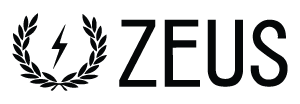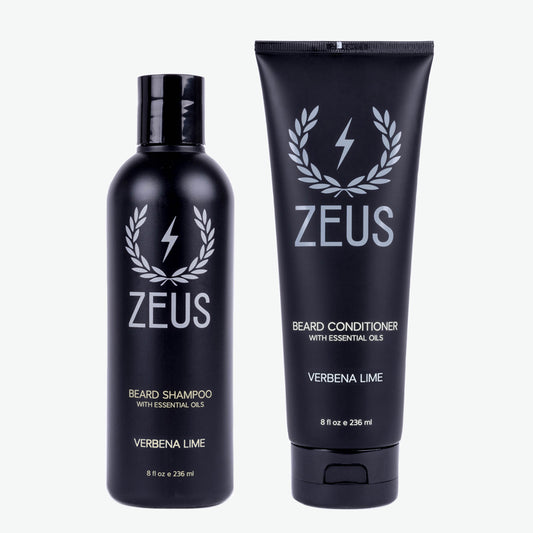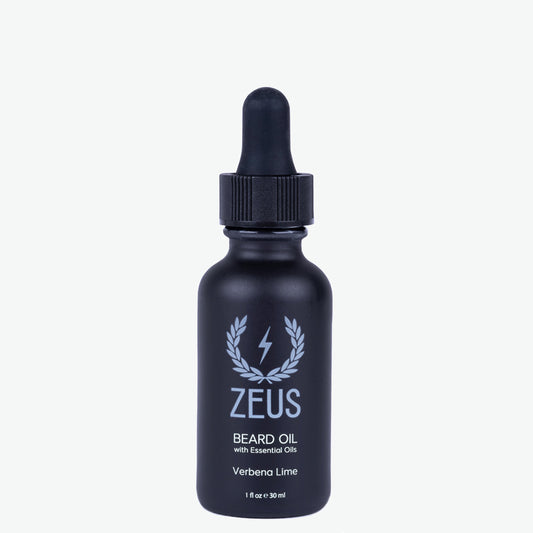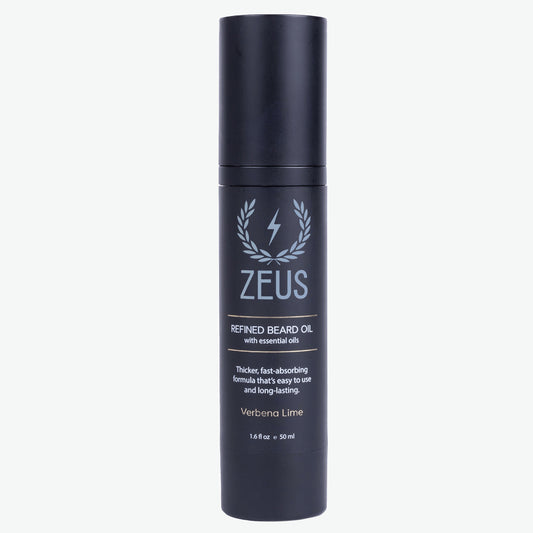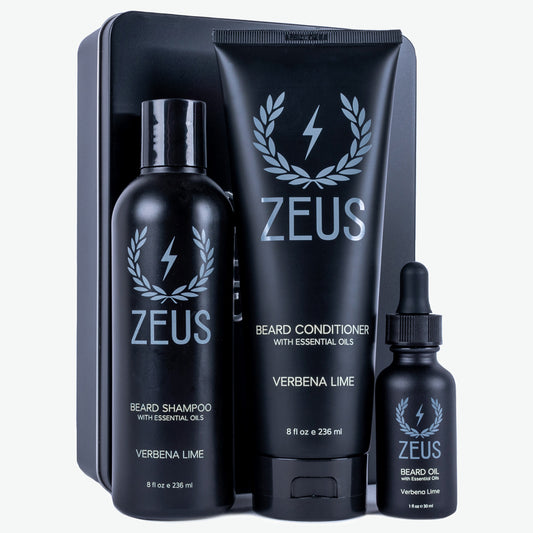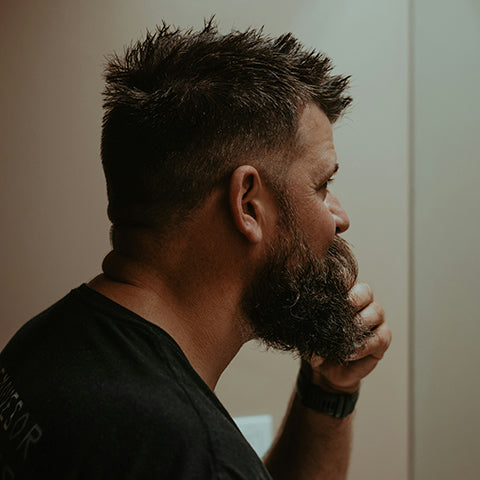
Why Your Beard is Itchy and How to Stop It
Share
Itchiness is often one of the more irritating but common side effects that come along with growing a beard. While an itchy beard may seem unbearable in the beginning, the good news is it doesn't last forever. Once your beard matures and softens, it will naturally start to ditch the itch. However, if you do find yourself asking, "why does my beard itch" months into the process, your discomfort is likely indicating issues hidden under the hair and in your habits.
Avoiding the discomfort from itchiness involves targeting and treating the source of the irritation. To help you pinpoint what's causing the problem, here at Zeus Beard, we compiled a list of itchy issues and how to fix them.
To check out other upcoming articles on common beard problems and products to fix them, follow us through our newsletter.
Does an itchy beard mean it's growing?
An itchy beard can mean your beard is growing, but not always. In the first stage of beard growth, some mild itchiness is normal as you transition from clean-shaven to bristled.
The reason new beards are often itchy is because the hairs are trained from trimming. This leaves strands stubby and sharp.
When these sharp bristles begin to break the skin's sensitive surface to grow, they can't help but tickle your face in the process.
While it will be tempting to tear away at your budding beard to relieve the itch, it's best to resist touching your face too much during this phase and simply let it do its thing.
After the first month, itchiness should start to subside and you should notice your bristles getting softer and more manageable on their own. However, itchiness that persists beyond this stage may be indicating an issue in your health or hygiene.
If you're experiencing an itchy beard and you've been at it for a few months, it may be time to make a few changes to your routine to keep your beard looking and feeling nice.
Factors that contribute to itch
Once your beard is out of the beginning stage, it's not quite as simple to pinpoint the source of your itchy situation. However, looking to your routine and habits can help you find the culprit.
1. Your beard and skin are too dry.
Longer beards often get itchy when they get too dry. Unlike the hair on your head, your beard's roots do not produce enough natural oil to sustain the ends. Once your beard breaks out of the short stage, beard oil becomes less of a convenient defense against itch and more of a necessity to replace missing moisture.
Since longer beards are already at a natural disadvantage when it comes to oil production, numerous factors can trigger dryness and itch. Along with being frustrating, itchiness caused by dryness may be an early signal of split ends and breakage in the future if not found and fixed.
How to fix dryness issues
Starting in the shower, water that is too hot or too cold can cause instant dryness and discomfort. In addition, using products intended for the hair on your head can damage the sensitive hair and skin on your face. Since these products account for the extra oil your head hair produces, they are often too harsh for your beard.
Instead it's best to opt for a gentle beard shampoo and conditioner. Zeus Beard shampoos and conditioners use gentle ingredients like Dragon's Blood, Green Tea, Pro-Vitamin B5 and Aloe Vera to treat itchiness associated with dryness.
Even with the right beard shampoo and conditioner, over-washing your beard can also lead to dryness. Shampoo is designed for washing your beard, while conditioner replenishes your beard's moisture. Washing your beard without the second softening step is likely doing your beard more harm than good. Simply keeping the two partners will help improve the quality of your beard.
However, even good shower habits don't fully protect your beard and skin out in the environment. Like water temperature, outside temperatures and sun exposure quickly lead to dryness. While sweat may offer false hope of added moisture on your beard, sweat is actually moisture leaving your body. Using refined beard oils or balms throughout the day to replace moisture will help combat dry ends and itchiness.
2. Your beard and skin are too dirty.
While dreaded beard itch is often caused by over-washed dry hair and skin, the opposite also proves true. When your beard or skin is too dirty, you'll likely experience itch and discomfort too.
This is the itch and discomfort you really need to listen to. With dry hair issues, you can see the effects as the ends of your beard begin to split and break. However, when your longer beard appears normal but still feels itchy, it's likely locking in debris and bacteria that can harm your health.
How to clean your beard
Beards that aren't being washed enough lead to skin and hair affected by acne, ingrown hairs and dandruff. Often the issue is that men remember to wash their beards in the morning but forget or get lazy around bedtime.
This major mistake allows all the dirt, debris and bacteria your beard collected throughout the day to settle into your skin and hair overnight.
When left untreated, repeatedly clogged pores can quickly transition from itchy to painful and even inhibit hair growth. If your beard starts to feel too dry from two washes a day, consider at least rinsing your face with warm water before bed to prevent overnight build-up between showers.
Applying beard oil or balm throughout the day isn't just for men seeking dryness relief. These products are also useful at creating an environmental barrier for your beard so dirt and bacteria have a harder time sticking to the surface.
3. Your beard type needs extra attention.
Sometimes the issue is less about how dry or dirty your beard is and more about your specific hair type and the tools you are using on it. Thick, coarse beards are more prone to itchy ingrown hairs and snagging. Using the wrong tools on thick or curly hair types can ruin the unique texture and leave you scratching in confusion.
When your beard is being forced through comb teeth that are too tight, it will often appear fullest at the roots and taper off to wiry ends. Switching out your combs and brushes will help your beard maintain fullness from root to tip and avoid persistent itching.
How to find the right beard comb or brush
When it comes to choosing the right combs and brushes for your collection, it's important to consider your hair type and styling needs. In general, combs tend to work well for wet styling, while brushes manicure dry beards better.
Men with shorter beards or thinner hair types benefit from combs with fine or medium teeth and soft boar bristle brushes that will keep the hair tight and secure. However, trying to force too much beard into these tools often leads to broken hair or a broken comb.
For thicker or curly beard types, it's best to use a wider comb or firm boar bristle brush that has more strength to combat snags. Zeus Beard afro picks offer the ideal solution for thicker hair types because they offer 1.7-inch rounded teeth for effortless gliding.
Other ways to avoid beard itch
While changing up your routine, it's also important to remember the effects food and stress have on your beard. Consuming an excess of junk food makes your skin itchy and oily.
Likewise, stress releases Cortisol, a hormone that is harmful to the natural Collagen in your skin. As the skin underneath your beard loses its flexibility and moisture, your beard is left dry and itchy. Improving your overall health will also improve the look and feel of your beard.
Follow our newsletter so you don't miss out on other offers like these!
Main image by Lance Reis via Unsplash
